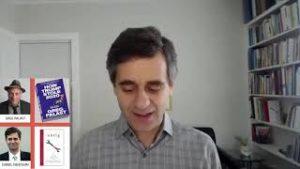Dr. Naomi Wolf in conversation with Daniel G. Newman and Greg Palast – PART 3



Daily Clout thanks Nicole Powers for her tireless efforts to edit and produce this transcript.
Author and former political advisor to Al Gore and Bill Clinton, Dr Naomi Wolf talks to Daniel G. Newman (author of Unrig: How To Fix Our Broken Democracy) and Greg Palast (How Trump Stole 2020: The Hunt For America’s Vanished Voters) about the challenges voters — and the very institution of democracy in the U.S. — face in the upcoming election. Both books “hold the key to what we can actually do to save the vote, save the election, and save democracy,” says Wolf, who moderates a discussion that is essential pre-election viewing.
WATCH DR. NAOMI WOLF’S DISCUSSION WITH GREG PALAST & DANIEL G. NEWMAN HERE
DN: I will say in terms of what can be done right now… Like right now, today, many states are revising the rules for mail-in ballots because people are stuck at home. You have North Carolina, which has loosened up somewhat on their very restrictive rules. But while they loosen up more, these are decisions by the state legislature and the governor and they’re happening right now. So one of the things that you can do being at home, watching this, is get in touch with the voting rights groups in your state and help them lobby for postage paid ballots and so you don’t need a witness in this time of COVID and other things that are, again, small rule changes, but will make a big difference on the margin and can be done today.
GP: Two things there. Number one, in the states, you do want to push for changes, but be careful. A lot of people in Wisconsin lost their vote because a judge said you didn’t need a witness signature on your mail-in ballot, which is a crazy thing. Only eight States require that. Why should there be a witness signature anyway? So the court said you don’t need a witness signature, and then the day before the election, the Supreme Court of Wisconsin reversed it. All those people who mailed in their ballots without that witness signature, their ballots were all junked. So be very careful. And I know that there are crazy mail-in rules, we should try to change them, but if we can’t, you gotta follow them no matter how insane they are.
By the way, like in Wisconsin, very few students have the mail-in ID, the ID you need to vote. And if you are a first time mail-in voter, you’re going to have to include a photocopy of that ID. And if it’s the regular student ID, sorry, you better go get a gun license cause that you can use to vote, but not the normal student ID. And if you use a student ID, are you ready for this? In Wisconsin, you have to have a letter saying you are a student enrolled in good standing. So, you know, if you didn’t pay your tuition, you flunked algebra, does that mean you can’t vote for president? This is the crazy stuff that’s going on. And I agree with Daniel, let’s start agitating against it.
There are a lot of groups, like ACLU of Georgia I know was suing about the postage in Georgia, ‘cause a hundred thousand people lost their vote for postage due in 2016. That’s going to be worse [this year]. A lot of it, by the way, is because people think I have to put one stamp on and most ballots are two stamps. This is the games that they play. ‘Cause someone’s going to challenge your ballot.
Our counties can also make things easier. Some counties can actually have the authority under state law to do things like in their county mail everyone a ballot. In Los Angeles, we’ve got these huge pull out postcards which help you vote and are extremely helpful, and that’s done at the county level.
NW: People watching this who are not… I like to call myself a democracy nerd, as Daniel knows. I think all of us can proudly call ourselves democracy nerds, but people who might not be that in the weeds are listening to this and they’re probably feeling quite depressed and disoriented. How do you know [who you can trust]? Let me give you an example. My son is a college student and he’s part of an organization to get his peers to vote. They’re texting people and saying go to TurboVote, make sure you’re registered. And people are saying, how do I know you’re for real? I don’t want to give you my information. I don’t want to engage with you. Because people are so jaded and traumatized that there are all these fake outreaches and bad actors interfering with communications about voting. If I’m just sitting here watching this, how do I know who to trust? Are there some organizations, are there websites, reliable lists of entities that I can go to and be sure you’re not being manipulated.
DN: I can say for one thing that the Secretary of State in your state, you go there and you know it’s government information, it tells you how to register to vote. And as Greg says, there are many rules. You can get the rules right there. Common Cause, the League of Women Voters are very long time, trusted organizations. Greg, I’m sure you have other assets to add.
GP: Yes, vote.org, But, again, you have to give a private non-profit group your email and your address, and then they will check and see your registration status and give you a link where you can reregister online. Every state allows you to register online by the way, except for South Dakota, cause they didn’t have registration. And, by the way, just cause they don’t have voter registration doesn’t mean that they have a bunch of Canadian moose coming in and voting. Or South Dakotans sneaking across the border to vote in North Dakota. So, you know, all these things are just crazy impediments. We have to live with them if we can’t change them in time.
NW: What should people do if they do physically go to the polls, they take all the precautions they should, and they’re turned away? What’s the thing to avoid and the thing to do in that situation?
GP: Well, obviously keep space, have your masks and gloves. But, number one, if you’re going to vote in person, try to vote in person early. I suggest midweek because the GOP has now figured out that in, for example, in Ohio, 70% of African Americans vote on the Sunday before voting, Souls to the Polls Day early voting. I was with Souls to the Polls in Ohio in 2012 and 2016 and the lines were five hours long. So try to go in midweek when those places are empty. If you can and have a mail-in ballot, walk it in to get it certified and get your signature verified. So you’re not one of the 600,000 people who have their ballots thrown out because someone challenged your signature.
NW: How about you, Daniel? Do you have suggestions about what to do if you’re turned away?
DN: There is an election protection hotline and Election Protection [866ourvote.org] is the website. It’s this coalition of national, local and state groups that have a hotline to give you advice. They have volunteers and attorneys.
GP: I believe that it’s 1-866-OUR-VOTE.
DN: Yes. I also want to note, just sort of looking at the big picture, obviously voting appropriately enough becomes a big topic around election time, but I want to mention this bill in the current Congress called HR-1. HR-1 was this bill that the Democrats introduced, called HR-1 ‘cause it’s the first bill that they introduced back in 2019. And if we have a President Biden and we have Democratic control of the House, then there’s going to be a lot of competing priorities on what should the Democrats do. And I think it’s important that all of us who care about voting and care about democracy, make sure that they continue to prioritize actually fixing democracy, right? So that means the equivalent HR-1, it should be the first thing introduced in the new Congress, and it should be the first thing passed. Because we’ve seen this pattern historically, the party out of power puts forward reforms, but then when they get in power, they don’t actually want to do them. And so it’s important not just to focus on your individual vote, and your individual state now, which is critically important, but to make sure that national voting standards, an end to gerrymandering, reinstating the Voting Rights Act, all of which are components of this terrific bill continue to get the first priority.
NW: What a great suggestion. You anticipated one of my questions, which is, will a change in party solve this problem? Obviously not. And that’s such a great suggestion. We’ll follow up with HR-1. We’ll do a reading of it and a video and we’ll do all we can to make sure that people keep it top of mind.
Let me go back to some possible scenarios, big picture… You said prepare for the worst, or prepare for the long haul. I know no one likes to talk about the worst, but I wrote a book in 2008 called The End of America that predicted 10 steps to fascism… No one likes to be Cassandra and I respect one doesn’t want to be predicting in an unpredictable environment. But I studied closing democracies in different times and places and they are all identifiable by certain things, and they’re happening now. You can expect that there will be groups of tough men milling around polls, because that’s how decaying democracies have behaved since the 1920s under Mussolini. I mean, you can expect that there’s going to be tampering with the vote. You can expect that there’s going to be the sewing of confusion around facts in the media, fake news, right? These are all part of the 10 steps to decaying democracy, even if you don’t want to say fascism or tyranny or totalitarianism, if you believe we’re not there yet. But I think we have to recognize that we’re in a chess match in which the outcome could be a hollowed out democracy. Where I’m going with that is, say, what unfolds, I’m going to just predict it, okay. Because I hate doing this, but I’m often right. So I’m going to do it. I’m going to say…
GP: You’re famous for being right, so I want to hear what you have to say.
READ PART 1 [The Transcription] of DR. NAOMI WOLF’S DISCUSSION WITH GREG PALAST & DANIEL G. NEWMAN HERE
READ PART 2 [The Transcription] of DR. NAOMI WOLF’S DISCUSSION WITH GREG PALAST & DANIEL G. NEWMAN HERE



